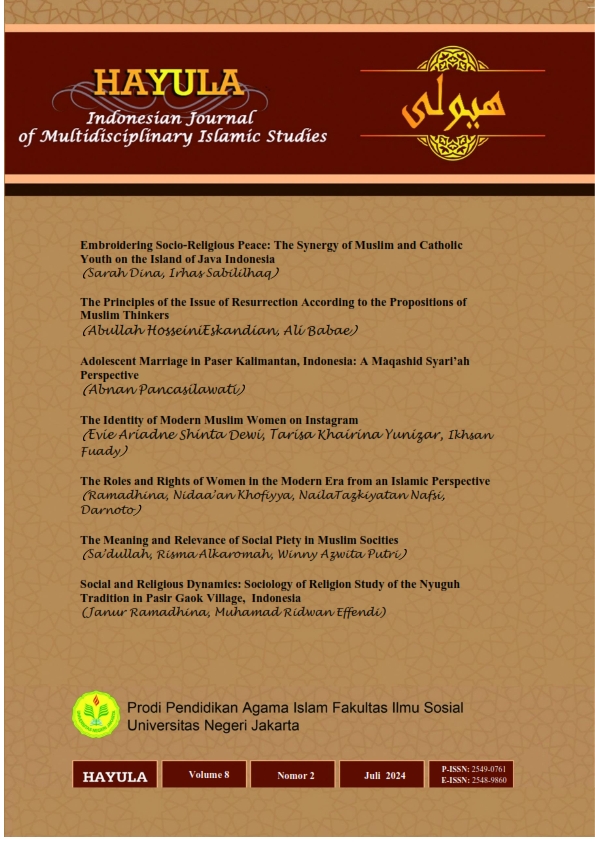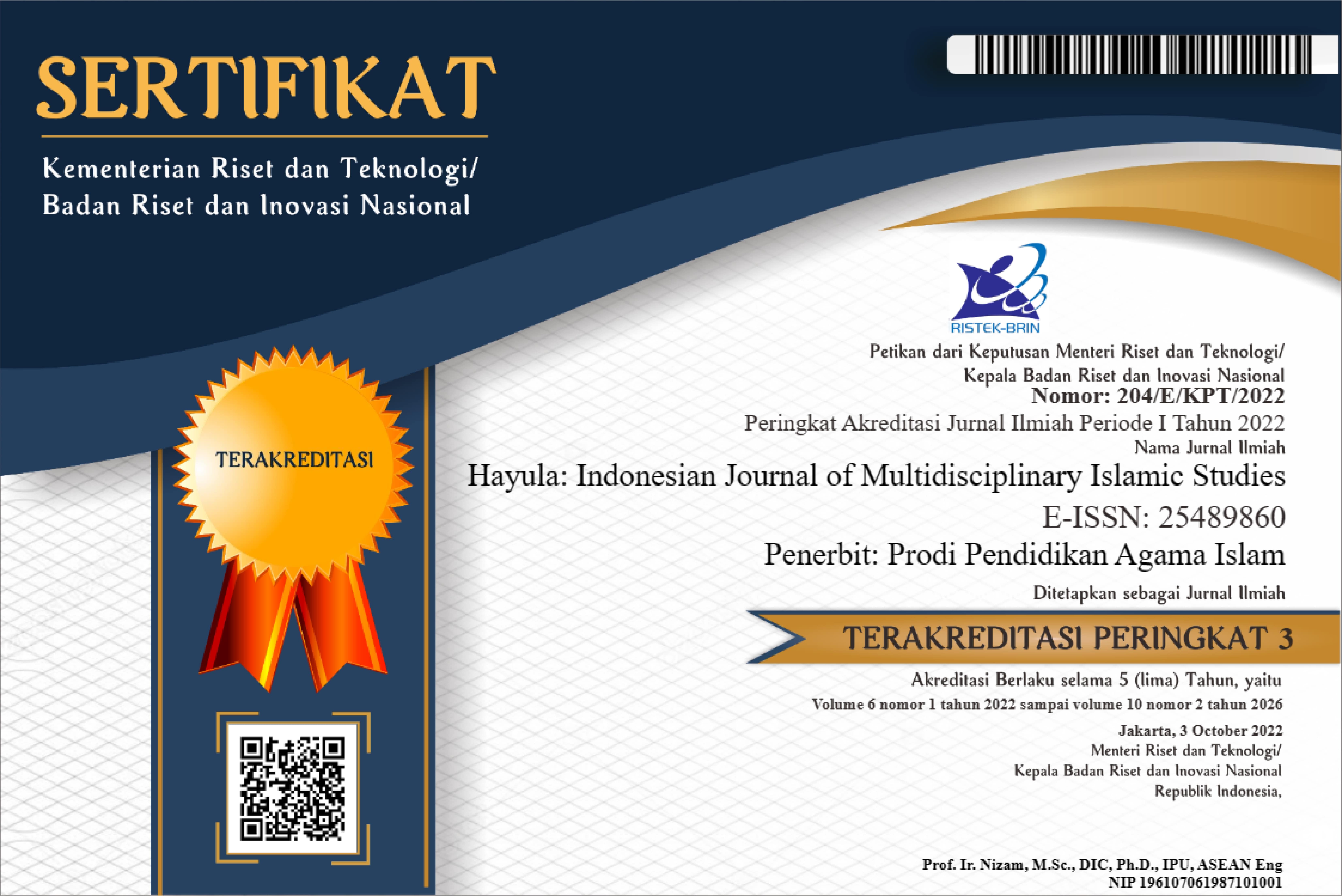The Principles of the Issue of Resurrection According to the Propositions of Muslim Thinkers
DOI:
https://doi.org/10.21009/hayula.008.02.02Keywords:
Resurrection, Islam, Holy Quran, Day of JudmentAbstract
The issue of resurrection is one of the basic principles of divine religions that all the divine prophets had the mission to invite people to believe in the Day of Judgment after being called to worship the Only God. Among the divine religions, Islam has shown special attention to the question of resurrection and this basic principle has been discussed and pondered by many Muslim thinkers. In addition to the religious aspect, the issue of resurrection is of fundamental importance since the general nature of the human race is mixed with it and humans tend towards happiness and good fortune. In this article, an attempt is made to investigate the importance and necessity of the issue of resurrection, the nature of resurrection, the types of resurrection, the questions of resurrection and its proof based on the Islamic perspective, using a descriptive-analytical method. Apart from all the proofs that have been established to prove the issue of resurrection, it can be stated that human nature tends to an end beyond this material world that does not see himself limited in this world and sees a world beyond this material world in his horizon.
References
The Holy Quran Al-Ghazali, Mohammad bin Mohammad (2017), Tahafat al-Falasafeh, translated by Hassan Fathi, Tehran: Hikmat Publications, Second Edition Ashtiani, Jalal al-Din (1979), Commentary on the description of Hekmat Sabzevari's, edited by Abdul Javad Falaturi and Mehdi Mohaghegh, Tehran: MacGill University Press and Institute of Islamic Studies, First Edition Eji, Seyyed Mir Sharif (1988), Sharh al-Maqsih, Qom: Sharif Razi, First EditionFazil Miqdad, Miqdad bin Abdullah (1990), Irshad al-Talebin, Qom: Ayatollah Murashi Najafi Library, First Edition Helli, Hasan bin Yusuf (1984), Kashf al-Murad fi Sharh Tajrid al-Itiqad, Tehran: Islamic Publication Institute, First Edition Helli, Hasan bin Yusuf (1987), Kashf al-Fawad fi Sharh al-Aqaeed, Qom: Ayatollah Marashi Najafi Library, First Edition Ibn Arabi, Muhyaddin (1980), Al-Fotouhat al-Maciyyah, Beirut: Dar Sadhir, First Edition Ibn Sina, Hossein bin Abdullah (1984), Risalah al-Adhawiyya, edited by Hossein Khadiojam, Tehran: Itilaāt Publications, First Edition Ibn Sina, Hossein bin Abdullah (1985), Al-Mabdā wa Al-Maad, by Abdullah Noorani, Tehran: MacGill University Institute of Islamic Studies, First Edition
HosseiniEskandian...The Principles of the Issue of Resurrection......Page 172Hayula, P-ISSN: 2549-0761, E-ISSN: 2548-9860Sabzewaari, Hadi (1983), Sharh al-Manzumah, Suspension of Ayatollah Hassanzadeh Amoli, Beirut: Al-Tarikh al-Arabi Institute, First Edition Sadr al-Din Shirazi, Muhammad bin Ibrahim (1979), al-Shawahed al-Ruboubiyyah, Tehran: University Publishing Center, First Edition Sadr al-Din Shirazi, Muhammad bin Ibrahim (2006), al-Hikma al-Motaaliyyah, Qom: Mostafavi Publications, First Edition Saeidi Mehr, Mohammad (2013), Teaching Islamic Theology, Qom: Helleh Publications, 18th EditionSuhrawardi, Shahabuddin Yahya (2015), Sheikh Eshraq's collection of works, edited by Henry Carbone, Tehran, Institute of Research and Cultural Studies, Third EditionTabatabai, Mohammad Hossein (1982), Rasail Tawhidiya, Qom: Allameh Tabatabai cultural-scientific foundation, First Edition Tabatabai, Mohammad Hossein (2002), Al-Mizan fi al-Tafsir al-Qur'an, Qom: Islamic Propaganda Office, Fifth Edition
Downloads
Published
How to Cite
Issue
Section
License
Copyright (c) 2024 Abdullah HosseiniEskandian, Ali Babaei (Author)

This work is licensed under a Creative Commons Attribution 4.0 International License.
Authors who publish with this Journal agree to the following terms:
- Author retain copyright and grant the journal right of first publication with the work simultaneously licensed under a creative commons attribution licensethat allow others to share the work within an acknowledgement of the work’s authorship and initial publication of this journal.
- Authors are able to enter into separate, additional contractual arrangementfor the non-exclusive distribution of the journal’s published version of the work (e.g. acknowledgement of its initial publication in this journal).
- Authors are permitted and encouraged to post their work online(e.g. in institutional repositories or on their websites) prior to and during the submission process, as it can lead to productive exchanges, as well as earlier and greater citation of published works.
Users/public use of this website will be licensed to CC BY







